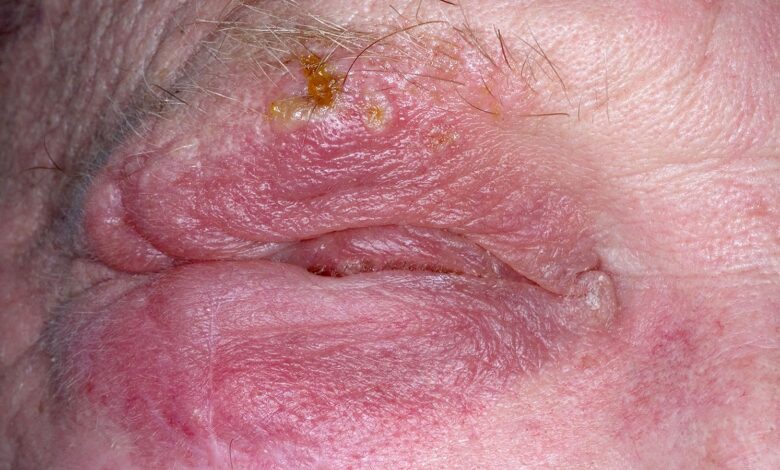Shingrix Tied to Higher Risk of Ophthalmic Shingles Recurrence

— Patients with a history of herpes zoster ophthalmicus who get the vaccine need careful monitoring
by
Katherine Kahn, Staff Writer, MedPage Today
February 15, 2024
The recombinant zoster vaccine (RZV; Shingrix) was associated with a significantly increased risk of recurrence of herpes zoster ophthalmicus (HZO), according to a retrospective cohort study.
Within 56 days after the start of follow-up for the outcome among patients with a history of HZO, also known as ophthalmic shingles, the incidence of recurrence after any exposure to RZV was 37.7 per 1,000 person-years compared with 26.2 per 1,000 person-years in the unvaccinated group, reported Nisha Acharya, MD, of the University of California San Francisco, and colleagues.
After adjusting for race and ethnicity, inpatient stays, emergency department visits, concomitant vaccines, and eye care practitioner visits, vaccination was associated with a 64% greater risk of HZO recurrence (adjusted HR 1.64, 95% CI 1.01-2.67, P=0.04), they noted in JAMA Ophthalmology.
“These results support consideration that patients with a history of HZO undergo monitoring by an eye care practitioner after receiving RZV in case of HZO recurrence,” Acharya and team urged.
“To our knowledge, no published data on RZV safety and effectiveness in these patients currently exists,” they wrote, adding that several cases of HZO reactivation have been reported after exposure to both recombinant and live zoster vaccines. Keratitis beginning 1 to 3 weeks after receiving a dose of RZV was the most common manifestation of HZO reactivation, they noted.
Despite their findings, they stressed that the recombinant zoster vaccine is effective for preventing herpes zoster, including HZO. “Encouraging vaccination is important, especially given the rising incidence of herpes zoster in the U.S. and its potential complications,” they wrote.
Because of the case reports, the American Academy of Ophthalmology recommended that patients with HZO only receive the vaccine after infection is under control. The CDC recommended that RZV be used in immunocompetent adults ages 50 and older and immunocompromised adults ages 19 and older, including those with a history of herpes zoster infection as long as they are not experiencing an acute episode.
Acharya and colleagues speculated that the mechanism of vaccine-related HZO may be an immune response to the RZV components that cause upregulation of transcription of viral DNA that is already present.
They noted that many clinicians are hesitant to give this vaccine in patients with a history of HZO, citing data from an unpublished study conducted by their group that found that 33% of cornea and uveitis specialists did not believe it was safe to administer RZV in those patients.
“HZO is different from herpes zoster in that recurrences are more common,” they wrote. “Thus, it is not surprising that there is some concern about RZV in patients with prior HZO.”
For this retrospective matched cohort study, Acharya and colleagues used medical and outpatient pharmacy claims data for commercial and Medicare Advantage enrollees from the Optum Labs Data Warehouse. They included data from a total of 16,408 patients with an initial HZO diagnosis from January 2010 through December 2021. Of these patients, 3,646 had received at least one dose of RZV more than 90 days after an initial HZO diagnosis (mean age at diagnosis 67.4, 62.2 women). These patients were matched with 12,762 unvaccinated patients, also with a history of HZO (mean age at diagnosis 68.8, 61.2% women).
Baseline characteristics, including severity of initial HZO infection, were similar between the groups. However, about 32% of vaccinated patients also received other vaccines within 28 days of receiving RZV versus 11% of unvaccinated patients. At the start of the study, 5.2% of the vaccinated patients and 3.7% of the unvaccinated group were using antiviral medications.
Patients were evaluated for a recurrence of HZO at 1 to 28 days, 1 to 42 days, and 1 to 56 days after vaccination. Within the 56-day period, there were 84 total recurrences of HZO.
-
![author['full_name']](https://assets.medpagetoday.net/media/images/author/2N5A0622_180.jpg)
Katherine Kahn is a staff writer at MedPage Today, covering the infectious diseases beat. She has been a medical writer for over 15 years.
Disclosures
This study was funded by a grant from the National Eye Institute and Office of Research on Women’s Health, National Institutes of Health, and an Optum Labs Data Warehouse research credit.
Acharya is an advisor for Roche outside the submitted work. No other disclosures were reported.
Primary Source
JAMA Ophthalmology
Source Reference: Walia A, et al “Risk of herpes zoster ophthalmicus recurrence after recombinant zoster vaccination” JAMA Ophthalmol 2024; DOI: 10.1001/jamaophthalmol.2023.6830.

